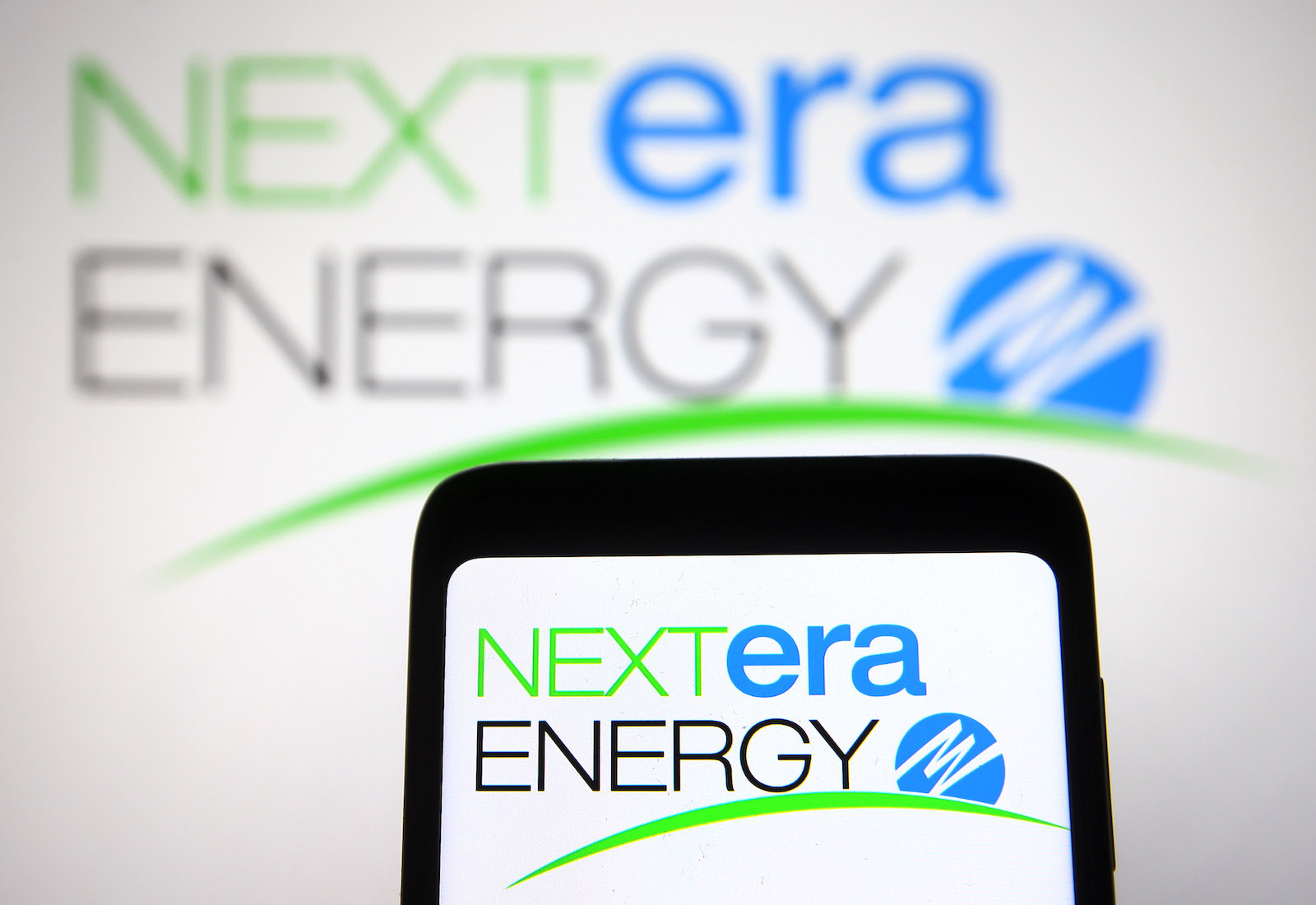As companies around the world pledge to achieve net-zero greenhouse gas emissions, a major U.S. energy company is charting a different path toward what it’s calling — and trademarking — “real zero.”
NextEra Energy announced this month that it intends to achieve “real zero” greenhouse gas emissions by 2045, zeroing out its climate pollution without the use of carbon offsets or carbon capture. According to NextEra — whose subsidiaries include natural gas pipeline developers, a major renewable energy producer, and one of the U.S.’s largest electric utilities, Florida Power & Light — the move is intended to establish the company as an industry leader, differentiating it from the slew of other firms whose net-zero commitments have come under scrutiny.
Environmental advocates agree that the move is largely positive, although questions remain over some of the details — especially the way that NextEra will lean on so-called “green hydrogen” to drive down emissions over the coming decades. “It should bring a lot of skepticism from climate activists and decision-makers,” said Sasan Saadat, a senior research and policy analyst for the nonprofit Earthjustice.
The main problem that NextEra is seeking to address with its “real zero” commitment is the unreliability of carbon accounting mechanisms that are often used in net-zero calculations. To neutralize their emissions, many companies rely on carbon offsets, which allow them to make up for ongoing climate pollution at their own firms by buying credits tied to projects that reduce emissions in other parts of the world. Basically, these credits act as a kind of promise that the emissions created in one area will be canceled out by emissions prevented somewhere else. One popular kind of offset involves forest conservation, which keeps carbon dioxide from being released when trees are cut down. Although it sounds good in theory, investigations from watchdog groups, journalists, and regulators have revealed a large number of offsetting schemes to be ineffective — or even “worse than nothing.” Forests that were ostensibly being protected for offsetting purposes, for instance, were never under threat from logging — which means that the purchase of offsets didn’t actually prevent any emissions.
This poses a major issue for the reliability of countries and corporations’ decarbonization commitments. If they continue to create climate pollution, justified on the basis of questionable offsets, greenhouse gases will continue accumulating in the environment, driving up global temperatures. It was in part because of far-reaching but poorly supported claims about carbon offsetting that a recent report from Net Zero Tracker, an analysis project coordinated by nonprofit organizations and research labs, identified an “alarming lack of credibility” within the net-zero landscape. “Relying on emissions offsets is not the right approach for companies to take,” said Takeshi Kuramochi, a senior climate policy researcher for the New Climate Institute and a co-author of the report.

NextEra acknowledged these problems in its commitment to “real zero,” swearing off carbon offsets in its own pledge to decarbonize. The company also objected to the inclusion of carbon removal, an expensive and as-of-yet unscalable technology that involves sucking carbon dioxide out of the atmosphere and sequestering it in rock formations or using other techniques to permanently remove carbon from the air. Instead, NextEra’s CEO, John Ketchum, has pinned his company’s strategy on the rapid expansion of renewable energy, as well as battery storage to deliver energy when the sun isn’t shining or the wind isn’t blowing. “We’ve worked hard in developing Real Zero to ensure we have a credible technical pathway to achieve our goals,” he said in a statement. His plan would see the creation of “hundreds of millions” of solar panels by 2045 and expand the company’s battery storage by at least a factor of 10.
So far, so good. Environmental advocates have applauded NextEra for recognizing the growing importance of solar and, as Saadat put it, calling out other energy companies’ reliance on the “fiction” of carbon offsets. John Lang, Net Zero Tracker’s project lead, also welcomed the company’s inclusion of interim emissions reduction targets every five years between now and 2045. However, he and others still shared concerns over NextEra’s “real zero” plans — primarily around the use of “green hydrogen,” a clean-burning fuel that’s produced by splitting a water molecule into hydrogen and oxygen using only renewable energy.
Green hydrogen is attractive to energy companies because it can be burned like fossil fuels, but doesn’t produce any planet-warming greenhouse gas emissions. NextEra leans heavily on it in its Zero Carbon Blueprint, detailing plans to convert roughly two-thirds of the company’s existing natural gas-fired power plants to run on green hydrogen over the coming decades. This means NextEra would create hydrogen to be burned in its own facilities, creating electricity that it could then deliver to customers. An interview Ketchum gave to Bloomberg also suggests that the company is open to transporting green hydrogen through pipelines to companies outside the power sector. When asked whether NextEra would pump hydrogen through the natural gas pipelines owned by its subsidiaries, Ketchum said ambiguously that “we have already invested in a company that has a lot of capability.”
Many environmental advocates agree that there is a legitimate need for hydrogen — particularly in hard-to-decarbonize industrial sectors like steelmaking or shipping. But for electricity generation, burning hydrogen in factories is an inefficient option. According to Kuramochi, energy losses can approach 50 percent when converting renewable energy into hydrogen and then back into electricity. That means wasting wind and solar power that could have been delivered to industry or consumers. “Why not use those renewables directly?” Kuramochi asked.
Doing so would also avoid the generation of nitrogen oxides, a class of pollutants produced from the burning of hydrogen that can cause breathing, cardiovascular, and developmental problems. Because natural gas-fired power plants are often located near disadvantaged communities, Saadat worries that converting them into hydrogen-burning facilities could replace one pollutant-spewing environmental justice concern with another. Instead, he recommended that NextEra decommission its natural gas-fired power plants and invest more heavily in solar, wind, and battery storage, as well as an alternative kind of hydrogen power that’s produced through fuel cells. Although fuel cells have the same efficiency problems as hydrogen combustion systems, the chemical reaction that powers them doesn’t produce any nitrogen oxide. In other words, fuel cells can serve as a pollution-free, dispatchable form of power during times of high demand.

Transporting hydrogen through pipelines, should NextEra choose to do so, could present even more problems. Because of hydrogen’s propensity to leak, existing pipelines can only accommodate a small amount of it blended with natural gas. According to Saadat, transitioning to 100 percent hydrogen would require an entirely new, hydrogen-specific pipeline network — the feasibility of which is unexplored in NextEra’s “real zero” blueprint. Although it’s unclear where NextEra would want to send its hydrogen, Saadat also cautioned against delivering it to people’s homes and businesses for heating and cooking. Doing so would require a massive infrastructural overhaul for technology that is still in its infancy — in contrast to electric appliances, which are already on the market and can easily connect to the grid today.
In response to Grist’s request for comment, NextEra said it would continue investing in technology to reduce emissions from its gas infrastructure business, but did not clarify whether it would transport green hydrogen through pipelines. The company defended its use of green hydrogen and said it would “collaborate with equipment suppliers to find engineering solutions” to nitrogen oxide pollution.
According to Lang, other energy companies that vocally support replacing natural gas with hydrogen have been criticized of greenwashing — using the hype around hydrogen to extend the life of their natural gas infrastructure and divert attention from the integrity of their net-zero strategies. That may be too harsh a judgment for NextEra, he added, but he did raise an eyebrow at the ostentatious branding surrounding the company’s decarbonization push. “You can’t trademark ‘real zero,’” he said. “That’s got the alarm bells ringing straight away.”
Stephen Smith, executive director of the nonprofit Southern Alliance for Clean Energy, shared many of Saadat, Lang, and Kuramochi’s concerns over NextEra’s green hydrogen plans, and he urged the company to disclose contingency plans in case its bet on hydrogen falls through. He also criticized the company for failing to incorporate energy efficiency upgrades into its decarbonization plan. Helping make customers’ homes more energy-efficient could lower electricity demand by many gigawatts between now and 2045, he said, reducing the need for green hydrogen — and all other energy sources. “The greenest electron is the one that never has to be used,” he quipped.
However, Smith emphasized the historic nature of NextEra’s pledge to build a massive amount of solar panels and move beyond questionable offsets — especially compared to the “smoke and mirrors” he’s seen in other energy companies’ decarbonization plans. For all of its flaws, Smith said, “real zero” represents a “paradigm-shifting” step toward greater transparency and accountability. “It’s the most serious proposal we’ve seen any utility in our region — and we think probably in the country — put forward.”
Editor’s note: Earthjustice is an advertiser with Grist. Advertisers have no role in Grist’s editorial decisions.



